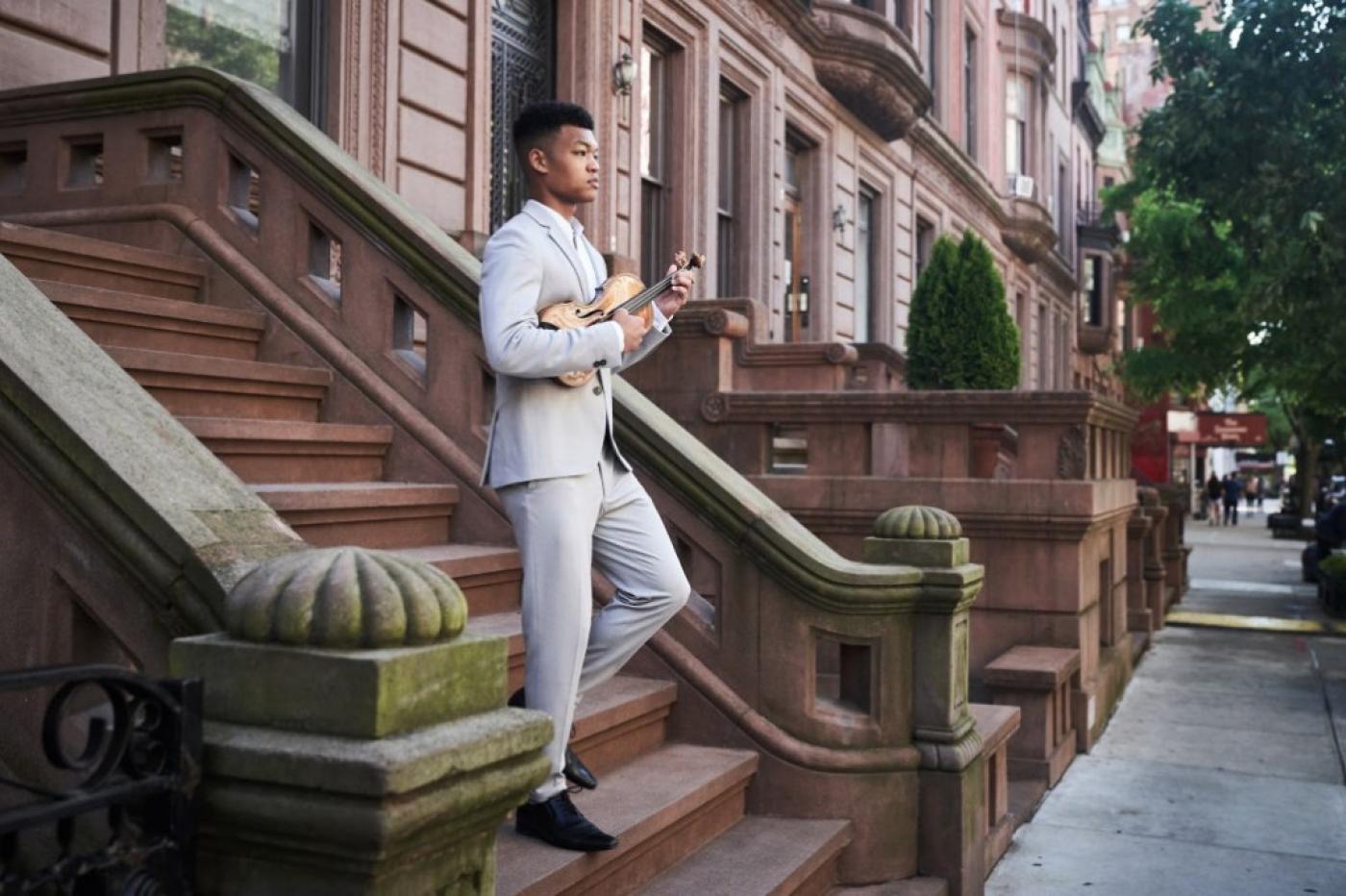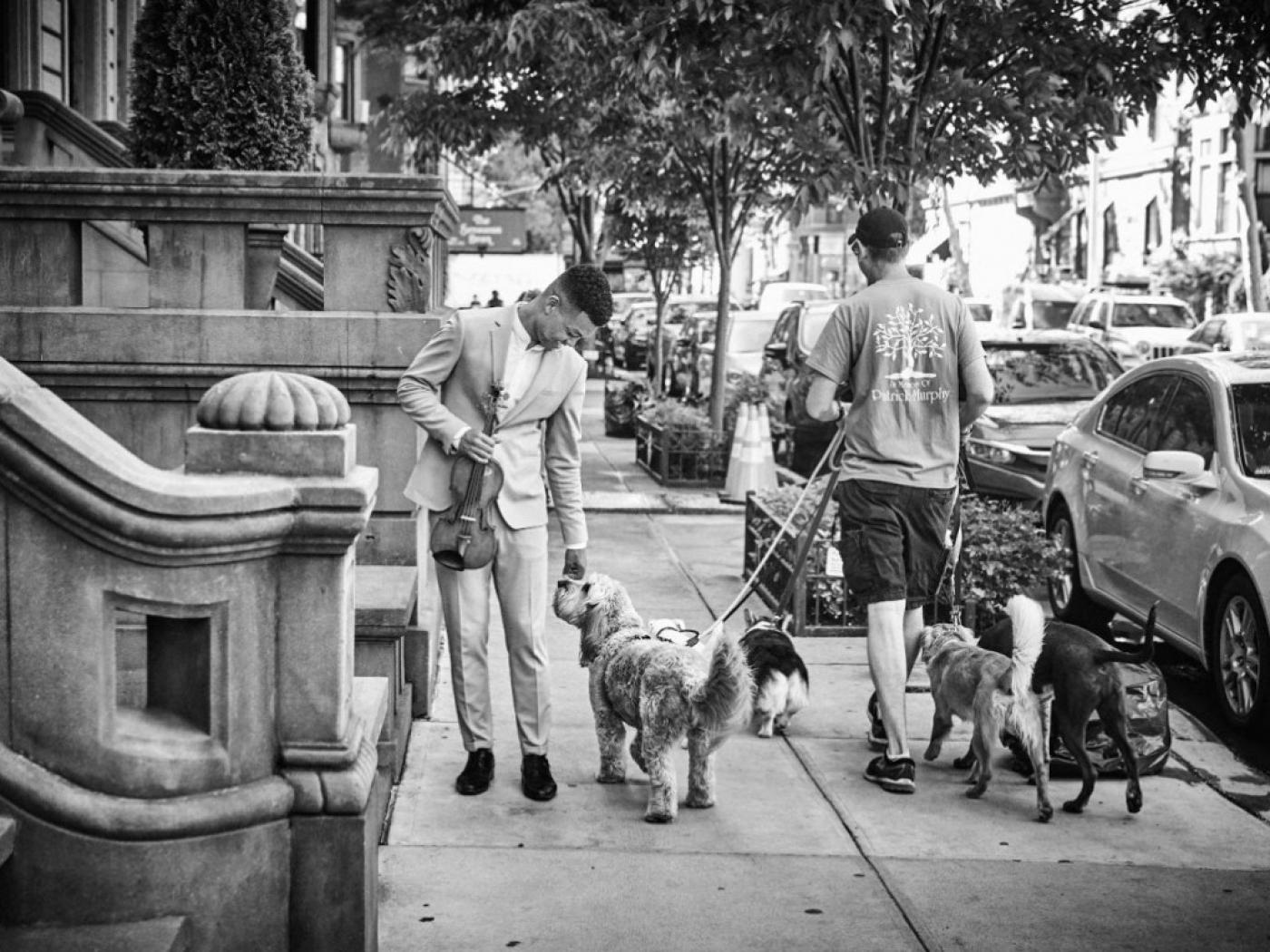“For me, music has been a way to inspire others.”
Randall Goosby
American violinist Randall Goosby is more than a celebrated young talent. He is a passionate ambassador for the power of music, for diversity in the arts, and for bringing the arts to where people live. I asked him about the meaning of the quote that opens his online bio: “For me, personally, music has been a way to inspire others.” His response was a virtuosic cadenza on the theme, ranging from inspiring young people, to diversity in the arts, to the program he is playing with the National Symphony Orchestra, which features a new work by Anna Clyne, the Mendelssohn Violin Concerto, a work by Samuel Coleridge-Taylor and Elgar’s Enigma Variations. I think we can all be inspired by his example.
Randall Goosby on inspiring young people
The quote generally is aimed towards and is sort of a product of my passion for playing for and inspiring young people; the next generation of either musicians or non-musicians who have a great appreciation for music. Growing up playing classical music, I definitely wasn't one of the cool kids. That's not to say that I got any flack for it, but I was pretty alone in terms of being the only one within my circle of friends in school that had that kind of interest. That was a big part of my life that I kind of couldn't relate to a lot of people on. Fortunately, later on I found a really, really wonderful community in music. That's a big part of the reason why I kept going with it. So for me having grown up and not really had any kind of personally relatable role models was something that I'd like to be able to give back and to provide for the next generation.
So that quote, using music as a way to inspire others, is primarily me talking about getting up in front of groups of young people who don't know anything about classical music and have never seen a live violin performance before and giving them a taste of really how magical it can be purely as an art form, but I think on top of that, and perhaps even more importantly, I'd like to inspire others not only with music but also just by having candid and casual interactions with kids and giving them a sense that “hey classical music doesn't have to be this stuffy boring thing that society has made it out to be.” I'm a normal kid. I like to play video games. I like to hang out with my friends. I like to play sports and get competitive and music is simply an expressive outlet for me. I think not enough emphasis is placed on having an expressive outlet and having somewhere where you can just pour your heart into something without having to worry about how it's received by others.
Classical Music is for Everyone
That's not to say that you can't inspire people of any age with classical music. I've seen that happen personally a great deal and I think that's something very powerful just in the sense that you know music can inspire you to turn your day around, or turn your week around, or try something new. Go listen to some music that you've never listened to before. Go express an emotion that you haven't had a chance to express or maybe one that you didn't even know you had. Music is a way to open people's minds up and inspire them to try something new or do something or think about something a little bit differently. I think with young people they've got so many years ahead of them to use whatever inspiration I might be able to give them or whatever spark I might be able to ignite and so that's been a real cornerstone of the work that I've done in music.
Diversity in Programming
I think diversity of artists and programming broadens the scope, it broadens the perspectives, and it broadens the reach of classical music. I think a big part of the reason why classical music is such a little niche corner of the performing arts is because a lot of people feel like they can't relate to it. That's for any number of different reasons, one of which being the stuffy and exclusive atmosphere that classical music sort of exudes. But I think a part of it is that until 5-10 years ago there really wasn't a whole lot of emphasis and importance in diverse programming, diverse performers, and therefore diverse audience members. I think programming works by composers who have completely separate and unique life stories and experiences allows more people to connect to that music. Not everybody knows or can appreciate what it was like and what the things that Mozart was trying to express might be, but for some people going and seeing a piece by a Black composer played and performed by a Black conductor creates a window for them to really look through and they can actually see a little part of themselves through that music. And that goes for Black composers, that goes for Asian composers, Native American, Indian whatever the case may be. The more walks of life the more backgrounds and cultures that we can depict and the more widely varied stories that we can tell through music, the more people are going to be interested and the more people are going to feel like they can actually relate and find a way into this artform for themselves.
People expect the fact that performers and composers are more diverse, they expect that to immediately impact the diversity of the audience. But what I think the really important part of that equation is, is that you got to go into the community and let them know that we're telling their stories. You can't expect a community that has nothing to do with classical music and wants nothing to do with classical music to see that there's a Black composer and suddenly go “Ohh wow! Now I can go to the symphony.” You have got to give them a reason to go. That's why for me going into alternative spaces, schools, community centers, and getting in front of young people and saying, “Hey! Look at me play this music by people who look like us,” is a lot more powerful than sitting up there on stage and playing music by these composers, but really not taking the opportunity to really grab the audience and say, “Hey. Look. This is why you should care. This is why this music is for you.” I think we're trying to bring more and more people into classical music and I think the way that we're trying to do that is by bringing more and more people into what we see and what we hear on stage via the composers, conductors, performers, whatever the case may be.
The NSO Program May 16-18
I'm really excited what about the great deal of diversity on this program. I love that a piece as cherished over time and a piece that so solidly fits in the cannon like Elgar’s Enigma Variations is paired with some of these pieces and some of these performers that not many people have had a chance to see. I think those kinds of pairings, pairing the well-known with the lesser-known put both in better context. Coleridge-Taylor and Elgar were very, very close. Elgar was a great mentor of Coleridge-Taylor and Coleridge-Taylor took a great deal of inspiration from Elgar. Elgar was actually the one who really championed Coleridge-Taylor and had some part to play in his success. Obviously, that's not to take away from Coleridge-Taylor’s gifts as a composer, but this program in particular falls exactly in line with the way that I like to program when I do recitals. I like to program works that everybody knows right next to works that nobody knows and it changes the way that people perceive both of those works whether they know them or not. So, I'm really excited to be a part of this program. I haven't worked with [conductor] Thomas Wilkins in several years, so [it will] be great to reunite with him and obviously looking forward to having my first go around with the National Symphony at the Kennedy Center.
PBS PASSPORT
Stream tens of thousands of hours of your PBS and local favorites with WETA+ and PBS Passport whenever and wherever you want. Catch up on a single episode or binge-watch full seasons before they air on TV.

